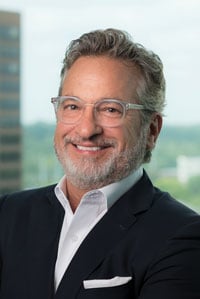
On Leadership: L. Mark Billeaud
A founding partner of Summit Real Estate Group in St. Louis shares his insights and lessons learned from nearly 35 years in the commercial real estate business.
Development: What drew you to a career in commercial real estate?

L. Mark Billeaud
L. Mark Billeaud: I always liked the built environment and the pathways that create it: finance, construction, people. When I got out of college, rather than pursue a master’s degree, I went to work with a brokerage firm specializing in the industrial sector. Prior to joining Summit Real Estate Group in 2009, I had worked for Trammell Crow Company, Duke Realty and as a partner with Maune Development Company in St. Louis.
Development: What brought you to Summit?
Billeaud: I was drawn to the seasoned team of professionals I would work with and the great opportunities open to me.
Development: How was your firm set up to handle the financial challenges of that period?
Billeaud: The Great Financial Crisis had been brewing for more than a year by 2009. When Lehman Brothers collapsed, that was the opening bell for a total financial breakdown of the global economy. Summit had to play defense with existing assets, but we also wanted to play offense and position ourselves to expand the business.
We had just formed a new partnership, and our primary goal was to create a source of ready capital that could be deployed opportunistically when others were on the sidelines. We established a vehicle for that — a private equity discretionary fund. This gave us the needed capital at the front of the transaction instead of at the rear, which benefited our project sourcing, execution and returns for investors.
Development: Tell us about your funds.
Billeaud: Since 2010, we’ve launched four funds. Fund I, Fund II and Fund III are fully and successfully realized. We’re in the final stages of deploying Fund IV capital. With our joint venture partners investing alongside our capital, Fund IV will end up with about $900 million of projects in six states. We are beginning the process of creating Fund V.
Development: Summit has a strong industrial real estate portfolio throughout the Southeast. Why did it focus on this asset class rather than diversifying into office, multifamily or retail when forming the funds?
Billeaud: Our senior leadership has experience in several asset classes, including office, industrial, multifamily and hotel. In our first two funds, we invested in retail as well as industrial. However, as e-commerce began to grow exponentially, we realized the risk-adjusted returns for industrial far outweighed retail. We made a pivot to 100% industrial in Fund III, which is where we remain.
Development: Are there any plans to expand beyond Summit’s industrial base? For example, what is your view of data center development?
Billeaud: We are always studying other real estate opportunities, especially subcategories in the industrial sector such as data centers, industrial outside storage and freezer-cooler. However, we think it’s important to remain focused, which for us is tried-and-true midsized, multitenant industrial buildings and business parks.
Development: Please describe Mission Realty Advisors, Summit’s 501(c)(3) that exclusively serves community-based nonprofits in the St. Louis area.
Billeaud: Over many years, we have helped quite a few nonprofits with their real estate needs, including acquisitions, expansions, construction and development. We helped them do what we do every day at Summit, but on a pro bono or reduced-fee basis. As our team grew, we decided we could do more to help the nonprofit community in St. Louis because there is a real need for such services.
Development: What do you look for when hiring senior leadership at the firm?
Billeaud: If you think about the spectrum of skills needed to invest in real estate — finance, analytics, marketing, creativity, social skills and so on — I prefer individuals who would grade at a B-plus or better over the broad set of skills as opposed to an A-plus in one category and C’s in others. In other words, we need well-rounded team members.
Development: As a founding partner, you are responsible for investments, and you manage the Arrowrock Fund Series. What is the greatest challenge in your role?
Billeaud: Deal sourcing is always challenging. Finding viable investment acquisitions with legitimate value-creation potential can be difficult. For ground-up development, we have the added challenge today of entitlements, especially zoning and site plan approvals. Community leadership wants real estate that helps produce job growth, but many of their constituents are slow- or no-growth-minded.
Development: What is your greatest leadership challenge today at Summit?
Billeaud: We have 22 people at the firm. My team is composed of seven talented individuals. Candidly, as the leader of that team, I don’t feel challenged. It’s a complete joy. We work hard, have fun and put people in position to utilize their talents to the fullest — for their benefit and our investors’ benefit.
Development: When conflicts arise or mistakes are made, how do you handle these situations as a company?
Billeaud: We try to never miss an opportunity to learn from our mistakes. When a mistake is made, we talk about it openly and try to figure out how not to make that mistake again. To help limit mistakes, one to two weeks before we launch a project, we have an “Add Them Up Again” meeting. Starting from the beginning of a project, we look at all aspects from a financial, construction, marketing and leasing perspective to analyze if have we missed something, because after a project hard launch happens, it is too late.
Development: What is your outlook for commercial real estate over the next three to five years? Are there things that concern you about the market looking forward?
Billeaud: We are very positive about commercial real estate, particularly our focus on industrial. Although many factors have come into play over the past few years, e-commerce leads to the growth of industrial real estate.
The other big positive is the trend to onshoring of manufacturing. For a while we thought it was just a buzzword and a temporary trend. But there are changes in the planet’s geopolitical structure requiring companies to bring jobs back to the U.S. Fortunately, we have a talented labor pool in this country. To some degree, that labor has gone dormant, but quality labor is still out there and wants to be put back to use. Corporate America needs to bring its processes back home. Industrial real estate is on a positive growth trajectory for those reasons.
Development: When you started your career in commercial real estate, did you have a mentor?
Billeaud: As I began my career, my goal was to find as many mentors as possible. I sought out senior mentors in their respective fields, as well as individuals who were just starting out in the business but whom I admired and could learn from nonetheless.
Development: What do you consider the most important lesson from your years in the business that could be passed on to others?
Billeaud: When you get knocked down, you need to get right back up, roll up your sleeves and get back in the saddle. You need to have a mindset of perseverance and work hard at it.
Development: What advice do you have for someone just entering the business today?
Billeaud: Do not seek out a work-from-home job if you are just starting out in commercial real estate. Real estate is a people business. It is a people business inside the office and outside the office. You need to be constantly communicating with the people you work with, and just being together helps that communication. This goes back to my Trammell Crow days. Trammell Crow had created an empire, but he was at an open desk in an open office, just like everyone else. How he operated made an impact on me. My partners at Summit are 100% aligned on this concept.
Development: How do you like to spend your off hours, away from the demands of Summit?
Billeaud: I am a homebody. I love being with my wife and children and our pets. One hobby I have is cars. I like to take one of my cars out to a track every quarter or so.
Ron Derven is a contributing editor to Development magazine.





